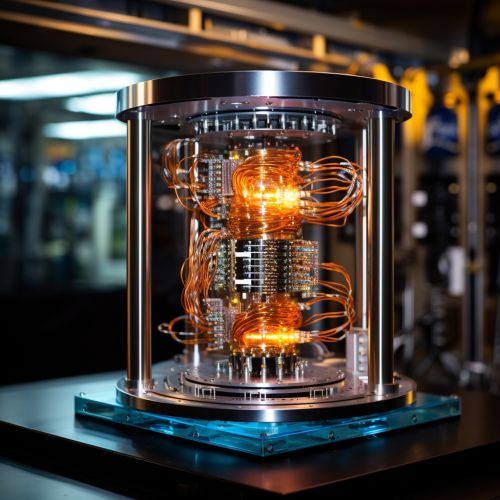Quantum Computing with Quantum Circuit Design
Introduction
Quantum computing is a rapidly evolving field that leverages the principles of quantum mechanics to perform computations. Unlike classical computing, which uses bits as the smallest unit of data, quantum computing uses quantum bits, or qubits, which can exist in multiple states at once due to the quantum phenomenon of superposition. This allows quantum computers to process a vast number of possibilities simultaneously, potentially solving complex problems much faster than classical computers.
Quantum Mechanics and Quantum Computing
Quantum mechanics is the branch of physics that deals with the smallest particles in the universe, such as atoms and subatomic particles like electrons and photons. The principles of quantum mechanics are fundamentally different from classical physics and provide the basis for quantum computing.
One of the key principles of quantum mechanics is the concept of superposition. In classical computing, a bit can be in one of two states: 0 or 1. However, a qubit in a quantum computer can be in a state of 0, 1, or any superposition of these states. This means that a qubit can hold multiple states at once, allowing quantum computers to process a vast number of possibilities simultaneously.
Another principle of quantum mechanics used in quantum computing is entanglement. When qubits become entangled, the state of one qubit becomes directly related to the state of another, no matter the distance between them. This phenomenon allows quantum computers to perform complex calculations more efficiently than classical computers.


Quantum Circuit Design
Quantum circuit design is a crucial aspect of quantum computing. A quantum circuit is a sequence of quantum gates, which are operations that change the state of a qubit. Quantum gates are analogous to the logic gates used in classical computing but have the added complexity of dealing with superposition and entanglement.
There are several types of quantum gates, each performing a different operation on a qubit. Some common quantum gates include the Pauli-X, Pauli-Y, and Pauli-Z gates, the Hadamard gate, and the controlled NOT gate. The choice and arrangement of these gates in a quantum circuit determine the computation performed by a quantum computer.
Designing a quantum circuit is a complex task that requires a deep understanding of quantum mechanics and quantum computing principles. The design must take into account the principles of superposition and entanglement, as well as the physical limitations of quantum computers, such as decoherence and quantum noise.
Applications of Quantum Computing
Quantum computing has the potential to revolutionize many fields, including cryptography, optimization, machine learning, and material science.
In cryptography, quantum computers could potentially break many of the encryption algorithms currently in use. This is due to Shor's algorithm, a quantum algorithm that can factor large numbers exponentially faster than the best known classical algorithms. However, this threat has also spurred the development of quantum cryptography and quantum key distribution, which could provide secure communication resistant to quantum attacks.
In optimization and machine learning, quantum computers could potentially solve complex problems and train models faster than classical computers. This is due to quantum algorithms like the quantum approximate optimization algorithm (QAOA) and the variational quantum eigensolver (VQE), which leverage the power of quantum superposition and entanglement.
In material science, quantum computers could potentially simulate quantum systems more accurately and efficiently than classical computers. This could lead to the discovery of new materials and drugs.
Challenges and Future Directions
Despite the potential of quantum computing, there are several challenges that need to be overcome. One of the main challenges is the issue of quantum decoherence, which is the loss of quantum information due to interaction with the environment. This limits the time during which a quantum computer can perform computations, known as the quantum coherence time.
Another challenge is quantum error correction, which is the process of correcting errors that occur during quantum computations. Unlike classical error correction, quantum error correction is a complex task due to the principles of superposition and entanglement.
The field of quantum computing is rapidly evolving, with ongoing research in quantum algorithms, quantum error correction, and quantum hardware. With advancements in these areas, the potential of quantum computing could be realized in the coming years.
